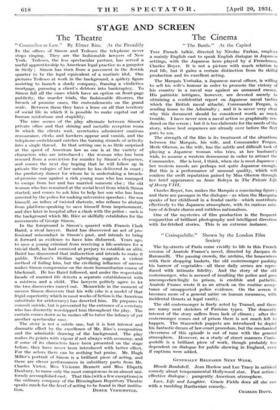STAGE AND SCREEN The Theatre
" Counsellor-at-Law." By Elmer Rice. At the Piccadilly IN the offices of Simon and Tedesco the telephone never stops ringing. They are the fashionable lawyers of New York. Tedesco, the less spectacular partner, has served a useful apprenticeship to American legal practice as a gangster in Sicily ; Simon has risen from a pavement in the Jewish quarter to be the legal equivalent of a matinee idol. One pictures Tedesco at work in the background, a spidery figure assisting to launch a shady company, framing a vindictive mortgage, pursuing a client's debtors into bankruptcy. To Simon fall all the cases which have an option on front-page publicity, the murder trials, the fashionable divorces, the breach of promise cases, the embezzlements on the grand scale. Between them they have a lease on all that territory of social life in which it is possible to make capital out of human misfortune and stupidity.
The nine scenes of the play alternate between Simon's private office and that shining and metallic reception room in which the clients wait, secretaries administer cautious reassurance, clerks and hawkers appear and vanish, and the telephone-switchboard catches the turning strands of activity into a single thread. In that setting one is as little surprised at the speed of American law as one is at the variety of characters who are introduced : the woman who has been rescued from a conviction for murder by Simon's eloquence, and comes the next day hoping that he will follow up in private the eulogies of her nature he has delivered in court ; the predatory dancer for whom he is undertaking a breach- of-promise case against a rich young man who has managed to escape from her and has married someone else ; the old woman who has remained at the social level from which Simon started, and comes to ask him to help her son who has been arrested by the police for making subversive speechei ; the son himself, an influx of twisted rhetoric, who refuses to abstain from platform-speaking to save himself from imprisonment, and dies later in hospital after a clash with the police : such is the background which Mr. Rice so skilfully establishes for the movements of George Simon.
In the foreground is Simon's quarrel with Francis Clark Baird, a rival lawyer. Baird has discovered an act of pro- fessional misconduct in Simon's past, and intends to bring it forward as evidence to have him disbarred. Years ago, to save a young criminal from receiving a life-sentence for a trivial theft, he had connived at perjury to establish an alibi. Baird has discovered that indiscretion and intends to make it public. Tedesco's Sicilian upbringing suggests a violent method of foiling him, but the civilizing influence of success makes Simon compromise on the more humanitarian course of blackmail. He has Baird followed, and under the respectable facade of married life detects a separate establishment with a mistress and a child. The lawyers politely agree to let the two discoveries cancel out. Meanwhile in the moment of success Simcn discovers that his wife (she is a model of that frigid superiority which in most works of fiction is the American substitute for aristocracy) has deserted him. He prepares to commit suicide, but is prevented by the entrance of a secretary who has discreetly worshipped him throughout the play. The curtain comes down as he rushes off to tutor the infancy of yet another spectacular case.
The story is not a subtle one, but it is lent interest and dramatic effect by the excellence of Mr. Rice's composition and the admirable drawing of the background. The play makes its points with vigour if not always with economy, and if sonic of its characters have been presented on the stage before, they have never been introduced with better effect. For the actors there can be nothing but praise. Mr. Hugh Miller's portrait of Simon is a brilliant piece of acting, -and there are clever performances in subsidiary parts from Mr. Charles Victor, Miss Vivienne Bennett and Miss Elspeth Duxhury, to name only the most conspicuous in an almost uni- formly accomplished cast. That this (with a few exceptions) is the ordinary company of the Birmingham Repertory Theatre speaks much for the level of acting to be found in that institu-












































 Previous page
Previous page